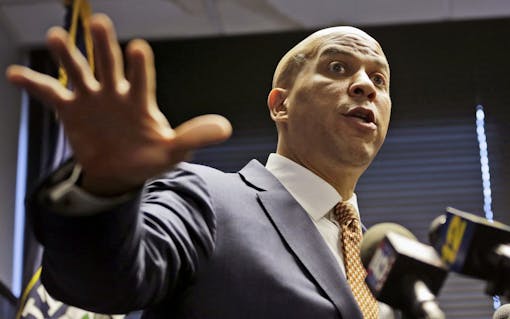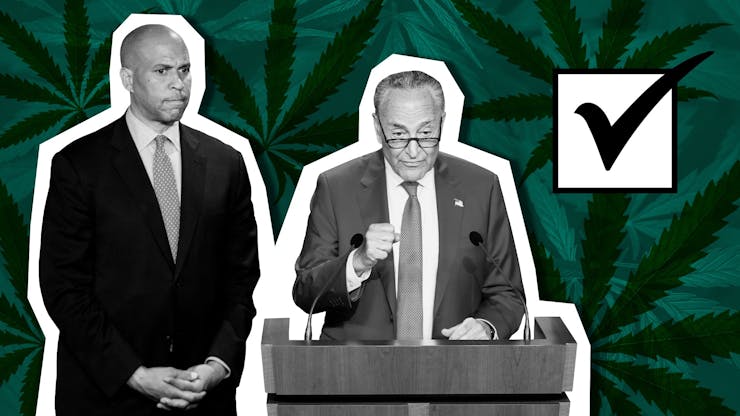The latest federal legalization bill (CAOA) would remove cannabis from the controlled substances list and expunge marijuana offenses—but will Democrats get it through Congress before November elections?
The Cannabis Administration & Opportunity Act (CAOA) was officially filed today (July 21). The bill would legalize cannabis nationwide, ending federal prohibition and expunging records of some cannabis offenders. The CAOA also lays out a framework to establish a federal cannabis tax and create FDA regulations for cannabis products.
A draft of the CAOA began circulating more than a year ago. After 1,800 comments from lawmakers, the federal legalization bill has grown from the 163-page original to 296 pages in the newly-released final draft.
“For far too long, the federal prohibition on cannabis and the War on Drugs has been a war on people, and particularly people of color,” said Senate Majorty Leader Charles E. Schumer (D-NY) in a press release after the bill was filed.
“(The CAOA) will be a catalyst for change by removing cannabis from the federal list of controlled substances, protecting public health and safety, and expunging the criminal records of those with low-level cannabis offenses, providing millions with a new lease on life.”
Sen. Chuck Schumer on the newly-filed Cannabis Administration & Opportunity Act (CAOA).
Here’s what CAOA authors Sen. Schumer, Sen. Ron Wyden, and Sen. Cory Booker put into the potentially groundbreaking federal bill.
Here’s what’s in the new federal legalization bill
The CAOA looks a lot like the MORE Act, which passed the House but not the Senate in April. Both MORE and CAOA would remove cannabis from the controlled substances list and allow the government to begin taxing weed sales. But a few major differences include tax rates and plans for distributing federal tax revenue.
Last year, Sen. Booker said the CAOA’s holistic approach to legalization would take priority over more limited specific efforts like the SAFE Banking Act. Sen. Booker has vowed in the past to block SAFE from moving forward, mostly because it lacks social equity and criminal justice reform measures.
Read the full CAOA bill here. The main takeaways from the almost 300-page bill include these:
- The Bureau of Alcohol, Tobacco, Firearms and Explosives (ATF), The Food and Drug Administration (FDA), and the Alcohol and Tobacco Tax and Trade Bureau (TTB) would collaborate to regulate different aspects of the cannabis industry.
- CAOA would protect cannabis industry workers’ rights, backed up by the potential loss of operating permits for companies that fail to abide by labor laws (Sec. 606).
- CAOA would allow banking access for cannabis businesses (Sec. 706).
- The Act requires re-sentencing and expungements for some cannabis offenders (Sec. 311).
- The Act places a federal excise tax of 5% on small- to mid-sized producers, gradually increasing to 12.5% after five years. For larger businesses, the federal tax rate would start at 10% and max out at 25%(!) (Sec. 5901).
- Some taxes would go to grant programs that fund nonprofit organizations specializing in job training, reentering society after incarceration, and securing legal aid.
- Equitable Licensing Grant Programs would be available to states and local communities who want to encourage minority and low-income people to participate in the industry.
- CAOA would launch a 10-year pilot program via the Small Business Administration to secure “intermediary lending” for “direct loans to eligible intermediaries that in turn make small business loans to startups, businesses owned by individuals adversely impacted by the War on Drugs, and socially and economically disadvantaged small businesses.”
- Federal employers could no longer drug test employees for cannabis, with some exceptions for jobs like law enforcement and national security.
- The Act would set a federal standard for impaired driving (Sec. 222). The Department of Transportation will have to develop regulations to identify THC-impaired driving within three years of enactment. The National Highway Traffic Safety Administration (NHTSA) would crunch data on impaired driving to educate citizens and law enforcement on a state level.
- 21 and older would become the minimum age to purchase cannabis nationwide (Sec. 1105).
- CAOA defines penalties for growing, manufacturing, shipping, transporting, receiving, possessing, selling, distributing, or purchasing 10 pounds or more of cannabis without State or Federal permission (Sec. 511).
- The Act outlines a new federal definition of hemp, increasing the permissible amount of THC to 0.7% of a plant’s dry weight, more than doubling the current 0.3% limit (Sec. 803).
- CAOA would remove “marijuana” from the controlled substances act within 180 days of the CAOA’s enactment.
- CAOA proposes banning all vaping delivery system products with added natural or artificial flavors.
- The FDA would expand to include a Center for Cannabis Products, which would regulate “the production, labeling, distribution, sales and other manufacturing and retail elements of the cannabis industry,” according to a rundown of the CAOA bill.
- States could prohibit marijuana production and sales, but they could not stop cannabis products from being transported between legal states while passing through a prohibition state.
- The Department of Justice would offer grants that would go toward hiring law enforcement, doing community outreach, and attempting to combat the illicit market.
- Access to federal benefits will be protected for those with cannabis convictions, including federal employees.
- Veterans would get expanded access to medical cannabis through physicians with the U.S. Department of Veterans Affairs (VA).
- All retailers would have a federal limit of 10 ounces per individual retail transaction.
- The Government Accountability Office (GAO) would facilitate marijuana policy studies on safety and compliance.
- The U.S. Department of Health and Human Services (HHS) and National Institutes of Health (NIH) would research diverse effects of marijuana products.
- The Act would increase the supply of cannabis available for scientific studies and research.
- CAOA funds public education that deters youth from consuming cannabis, plus state funding to prevent youth use and driving while impaired.
Next steps point to next Tuesday’s big meeting

The bill could make more progress as soon as next Tuesday (July 26), when Sen. Cory Booker is scheduled to lead the Senate Judiciary Subcommittee on Crime and Terrorism in a meeting about “Decriminalizing Cannabis at the Federal Level: Necessary Steps to Address Past Harms.”
Shop highly rated dispensaries near you
Showing you dispensaries nearDetails on the meeting have not been released, but the Democrats behind CAOA will likely press their colleagues across the aisle to get this massive bill passed as soon as possible. For now, the only thing standing in the way of federal legalization is the Senate, which has rejected past attempts to approve the MORE Act. If Democrats lose ground in November’s elections, as projected, the CAOA could float into purgatory or fizzle out for good.
With Republicans now favored to win control of the House but not the Senate in November, Democrats’ attempts to pass green energy and economic agenda bills could be sidelined for a while. So efforts are now focused on pushing to legalize America’s fifth-largest cash crop as a last-second long shot.
Weed has grown into one of America’s few bipartisan issues after booming throughout the pandemic. And with Pew Research Center reporting that 72% of Democrats and 47% of Republicans support the legalization of both medical and recreational marijuana, cannabis polls better than most candidates from either party.
Why social equity and criminal justice reform are key

Despite President Biden’s campaign promises, cannabis arrests have gone up 25% since he took office. And many states that promised to prioritize social equity have not followed through. That’s why lawmakers like Sen. Booker prefer this bill to SAFE and others, which barely consider the economic and social impact of legalizing while many Americans have had their lives altered by the unjust criminalization of cannabis.
According to the CAOA, “The continued enforcement of cannabis prohibition laws resulted in over 350,000 arrests in 2020, disproportionately impacting people of color who are almost 4 times more likely to be arrested for cannabis possession than their White counterparts, despite equal rates of use across populations.”
“People of color and Native Americans have been historically targeted by discriminatory sentencing practices resulting in Black men receiving drug sentences that are 13.1 percent longer than sentences imposed for White men and Latinos being nearly 6.5 times more likely to receive a Federal sentence for cannabis possession than non-Hispanic Whites.”
Cannabis Administration and Opportunity Act
The bill continues, “In 2013, simple cannabis possession was the fourth most common cause of deportation for any offense and the most common cause of deportation for drug law violations.”
The authors of the CAOA wrote that, “The United States has deported more than 45,000 people whose most serious conviction was cannabis possession.” The bills says that “fewer than one-fifth of cannabis business owners identify as minorities and only approximately 2 percent are Black. Applicants for cannabis licenses are limited by numerous laws, regulations, and exorbitant permit applications, licensing fees, and costs in these States, which can require more than $700,000.”
The CAOA bill states that in 2021, “legal cannabis sales totaled $25 billion” and that total revenue is projected to reach “$45 billion by 2025.” The taxes hauled in from those projected sales should improve society far more than the $3.6 billion the ACLU says that prohibition laws cost taxpayers each year.





